9 Common Newbie Mistakes To Avoid During Niche Selection for Your Online Business

Have you seen “The Wizard of Oz”?
The timeless 20th century Hollywood classic that has fascinated multiple generations and still gets millions of views on YouTube
It was a wonderful fairy tale with really likable characters and some great dialogues.
This dialogue, in particular, changed the way I looked at life.
“If you don’t know where you’re going, any road will get you there”
Which of course means that you can’t get anywhere in life unless you have clear goals and focus on well-defined objectives.
This directly applies to niche marketing as well.
In fact, that’s the whole concept behind going niche.
When your online marketing strategy doesn’t target a particular niche, it targets everyone.
And when you target everyone, you end up hitting no one!
Like it or not, the only way to succeed in any type of online business is to target a well-defined niche and develop strategies that are tailored to the needs of your target audience.
Which brings me to the reason I’m writing this post.
Choosing the right niche is critical for success in niche marketing.
Thankfully, it’s not as hard as you think.
So many newbies read ‘expert advice’ about niche marketing and immediately think of cheap, one-page niche sites that were so prevalent a few years ago (until Google Panda killed them for good).
As a result, they end up with a messed up understanding of niche marketing and make glaring mistakes in selecting a niche for their blog (and fail to make money, of course)
This post is about avoiding those mistakes (and doing things the right way)
Keep reading!
What You’ll Learn In This Post About Niche Selection
- Why it’s foolish to evaluate niches only from an affiliate marketing perspective (even if you plan to be an affiliate marketer).
- The fundamental mistake in niche selection that can kill your site before it’s even started.
- Passion or Profit – what should you consider? (This might surprise you).
- The only way to dominate a niche and profit over the long term.
01 – Having No Idea (or Wrong Ideas) of What a Niche Actually Is
Niche marketing is not a complex idea at all. Yet, so many people make it look so.
They have preconceived (and mostly incorrect) ideas of what a niche is and tend to base their strategies on those false assumptions.
A niche, quite simply, is a very specific topic or a group of closely related topics that people are interested in and spend money on.
If you forced me to define a niche in internet marketing terms in a simple sentence I’d say…
“A niche is a group of similar people with a shared problem, passion or interest”
It’s that simple.
For example, “Make Money Online” is a pretty broad topic for a blog as it could mean anything from online marketing to trading the stock market to gambling.
When creating a site, you can niche down to just one method, for example, “Making Money With Freelancing”.
But even “Freelancing” isn’t narrow enough because it can be done in hundreds of industries from writing to coding to web designing and beyond which are all very different skills with different needs.
You can niche down to “Making Money With Freelance Writing” which is a much more specific topic (making money online with writing) and focuses on a specific person (freelance writers).
“Freelance Writing” can be further narrowed down to “Making Money With Freelance Blogging” with the focus just being on those writers who want to make money from a blog over any other writing type.
Sounds more focused?
This is what I call a good topic for a niche site.
Here’s another example, online marketing is a big industry with lots of angles.
To stand out, you need to focus on a narrower niche within the online marketing industry.
Rankings.io, a seven-figure digital marketing company for law firms, is the perfect example of this

Source: Rankings.io
Online marketing is a HUGE industry.
But Rankings.io has limited its focus to law firms and practitioners in the U.S only which immediately positions them as experts in this area.
It has dozens of articles all focused on SEO and digital marketing for law firms.
It’s a classic example of a niche business.
Pro Church Tools is another great example.

Source: ProChurch Tools
The site helps churches in the U.S stay connected online with their members through digital marketing and has dozens of articles with different tips and tools to acquire, retain and engage church members.
Another example in the online marketing space is PlumberSEO.net which offers SEO advice and strategies just for Plumbers looking to generate more customers through Google search, it really doesn’t get more niche and specific than that, does it?
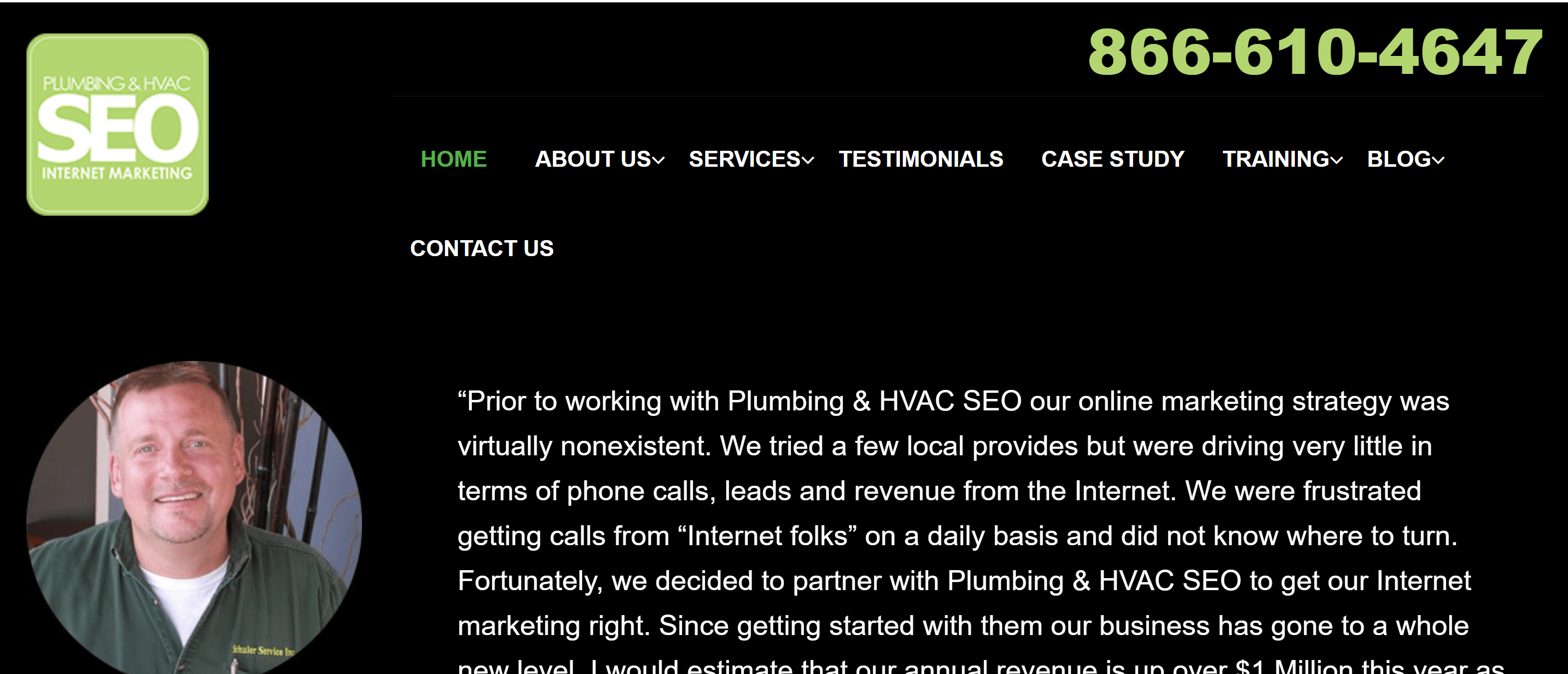
Source: PlumberSEO
All of these sites are part of the “online marketing” market yet instead of targeting everyone and anyone they are very specific with the audience they want to attract (lawyers, churches, and plumbers) which gives them a unique edge and makes them “niche”.
So get rid of any confusion you have about niche marketing and understand that its nothing more than a site with a marketing strategy that is laser-focused on a set of problems and a specific audience.
02 – Choosing a Niche Based on Products Instead of Problems
A product is NOT a niche.
And sites that are built around specific products are NOT niche sites.
It’s not like you can choose a range of drone cameras from Amazon, create a site about them and call it a niche site.
Even if it does make you a few hundred dollars, it’s not going to last for long because sooner or later the product will become outdated and people will move on.
What doesn’t change, however, is the need behind those products
Which is why successful niche sites are built around problems/needs, not products.
This Richard Branson quote says it nicely…

As does this quote by Rich Dad Poor Dad autor Robert Kiyosaki

The point is this…
Find a problem or need that people desperately want a solution for.
Then, create a site around that need, create content that shares solutions, and promote products that can solve that problem.
Digital Photography School, a very successful niche site, is a great example to follow.

Source: Digital Photography School
The site makes almost all of its money by promoting different digital cameras and photography equipment.
But the site itself is not created around a sole product or range of products. It’s not just trying to hard-sell you digital cameras by reviewing them and talking about features and why you need to buy this right now.
Instead, it helps people become better photographers, which is a growing need for millions of hobbyists and even common folks who own a smartphone or a digital camera.
Which means. it can promote any products that can help its audience create better photography which includes cameras, lenses, how-to guides, training programs, camera holders, and much much more.
Focusing on a problem, instead of a product, also gives you the room to create more useful and problem-solving content and find ideas from different angles.
Just look at the blog post titles in the screenshot below

Source: Digital Photography School
So the next time you’re tempted to create a site like “BestFruitJuicer.com”, where you only review fruit juicers and talk about the product features then zoom out, take a deep breath, and think of the reasons why people buy juicers, who buys them and create a site on that need and/or target audience instead (e.g. fitness enthusiasts looking to juice on the go or busy professionals who want to eat healthily but lack time to cook).
This brings me to another common newbie mistake in choosing a niche.
Let me explain in the next point.
03 – Getting the Passion vs. Profit Balance Wrong
Should you choose a niche you’re passionate about or a niche that has more money-making opportunities?
It’s one of the hottest debates in niche marketing yet all successful marketers have one answer: follow your passion
But passion is a strong word and can be slightly misleading.
You don’t have to be absolutely crazy about a niche to succeed. What matters is that you choose a niche you’re interested in and have some knowledge about. It should be something that doesn’t bore you to death because you’ll need to spend a lot of time working on it.
However, this doesn’t mean you should completely ignore the earning potential of a niche and focus solely on your passion. If the niche you’re passionate about doesn’t have a lot of products to promote or if it’s still something that people are reluctant to purchase online, you’ll have a hard time making money from it even f you create the most knowledge-rich website on that topic.
You need to strike the right balance and find a niche that matches your interests and also offers lots of opportunities to make money.
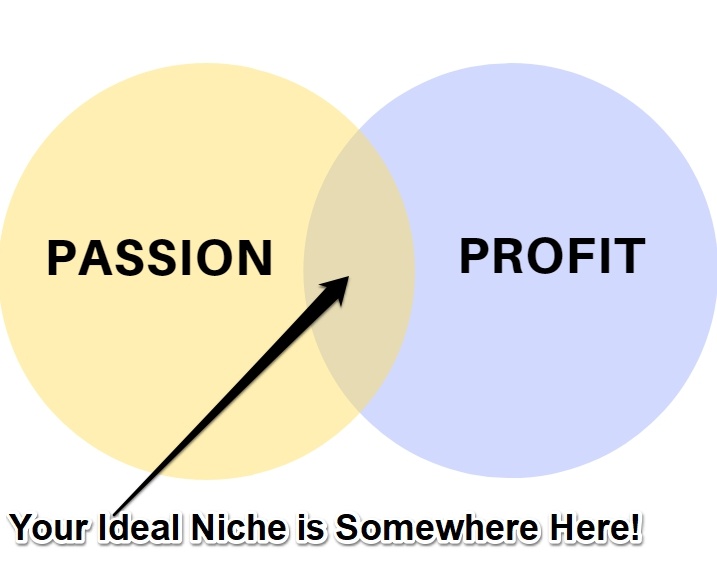
Since most newbies are prone to shiny object syndrome, money is often their only consideration while choosing a niche.
But because they have little knowledge of the niche and the problems of its target audience, they end up creating thin, vague, and mostly useless content that doesn’t give any value to their readers.
As a result, they fail to make money in that niche.
04 – Following the Dreadful Affiliate Site Model Thinking You’ll Make Easy Affiliate Commissions (Nooooo….)
I have nothing against affiliate marketing. In fact, in my opinion, it is one of the best ways to monetize a website.
What I don’t recommend, however, is making affiliate marketing the sole criterion for choosing a niche.
But most newbies make that mistake.
Instead of thinking long-term and creating an authority site that can use a number of monetization strategies, they create affiliate sites that rely solely on Amazon or ClickBank commissions.
Big mistake!
Learn from experts like Darren Rowse, the founder of Problogger, who has started several successful niche sites.
Because he chose niches based on problems instead of just their affiliate marketing potential, Darren was able to monetize them in lots of different ways.
He even shared a mindmap in which he listed all the ways he has monetized his sites.

Source: Problogger
As a newbie, starting an Amazon affiliate site is the worst thing you could do.
It not only limits the long-term growth of your site but also gets you in the wrong frame of mind where you’re always thinking about promoting your products for affiliate commissions instead of focusing on the needs of your audience.
Affiliate marketing is just a monetization method.
It’s not a business model itself.
It should always come after you’ve chosen a niche based on the actual needs of a well-defined audience segment.
I’ve previously shared examples of highly successful niche sites and affiliate sites that are making millions of dollars in affiliate commissions. But they’re all based on well-defined needs.
If you want to start a successful niche site, stop obsessing over affiliate marketing, broaden your horizon, and choose a niche based on the problems of a select group of people.
Then analyze the earning potential of that niche and only then choose different monetization strategies like advertising, affiliate marketing, memberships, product sales etc.
Not sure how you can estimate the amount of money you can make in a niche?
Let me explain in the next point…
05 – Not Researching the Earning Potential of a Niche Before Fully Committing To It
As I said earlier, always choose a niche that matches your interests and doesn’t bore you to death.
But its also crucial to evaluate the earning potential and the available money-making opportunities in a niche before fully committing to it.
Because at the end of the day, you’re into this niche marketing business to make money.
And if there aren’t enough ways to make money in your niche, even thousands of visitors will be useless for you.
Let me share an example.
I have a site in a very narrow and super-focused niche about certain rituals and religious events of a community.
Every year, a week before that event arrives, the traffic to my site starts increasing exponentially. At peak times, I’ve had as many as 8000 visitors at the same time in real-time traffic.
But guess how much money that site makes for me?
A few hundred dollars only (annually!)
Why?
Because it’s such a narrow niche that there are hardly any relevant products on Amazon (or any other affiliate program) that I can promote to my visitors.
Plus, because of the nature of the target audience, digital products or consultancy services also don’t make much sense.
All that’s left are a few hundred dollars that I make using Google Adsense.
Stuart has also shared a number of times how he started a few niche sites that were getting good traffic but couldn’t make money from them since they are very limited earning potential.
So before you enter a niche, do a bit of research on its earning potential.
Here are a few things you can do.
- Run a few Google searches to find other sites in that niche and see if they’re getting traffic and comments on their content.
- Search Google for your niche keywords and see if there are any paid search results (ads) in the list.

Source: Google
If people are spending money on advertising products/services in a niche, it’s a strong sign that there’s money to be made in it.
- Head over to Amazon and see if there are relevant products with lots of reviews. That’s usually a pretty good indicator of a niche’s earning potential

Source: Amazon
Look t the average number of reviews for the different products in that niche. More reviews mean a higher level of interest among buyers which of course indicates that there’s money to be made here.
- Check other affiliate platforms like Clickbank, JVZoo, CJ, ShareASale, etc. for relevant products.
If there are lots of different products related to that niche selling on e-commerce sites and affiliate platforms, it means there are people who’re already making money in that niche.
To join them, you need to research the niche, come up with better content angles, and create significantly better content than your competitors.
This brings to the next point which is perhaps the biggest mistake newbies make during niche selection
06 – Looking for an Easy and Unsaturated Niche That Doesn’t Require Hard Work
Is there any niche that doesn’t require hard work to make money?
You can say that some niches require less elbow grease than others but there is NO niche on the planet where you can rank a site without any hard work and then stay there for long.
Even if you do find a unique angle to an already established niche and dominate the search results for a few weeks, it won’t take long for your competitors to show up and dethrone you.
The only way you can consistently stay on top and make a regular, reliable and sustainable income from niche marketing is by offering significantly more value and creating exponentially better content than your competitors.
If you can do that, you’ll dominate even the most competitive and saturated niches imaginable.
Backlinko is a great example.
SEO and internet marketing are among the most saturated niches on the web.
Yet, Brian Dean established his site as one of the best in the world with just a few dozen articles.
How?
By creating 10x better, more useful, and presentable content than any of his competitors.
Just look at the number of social shares on just one of his articles
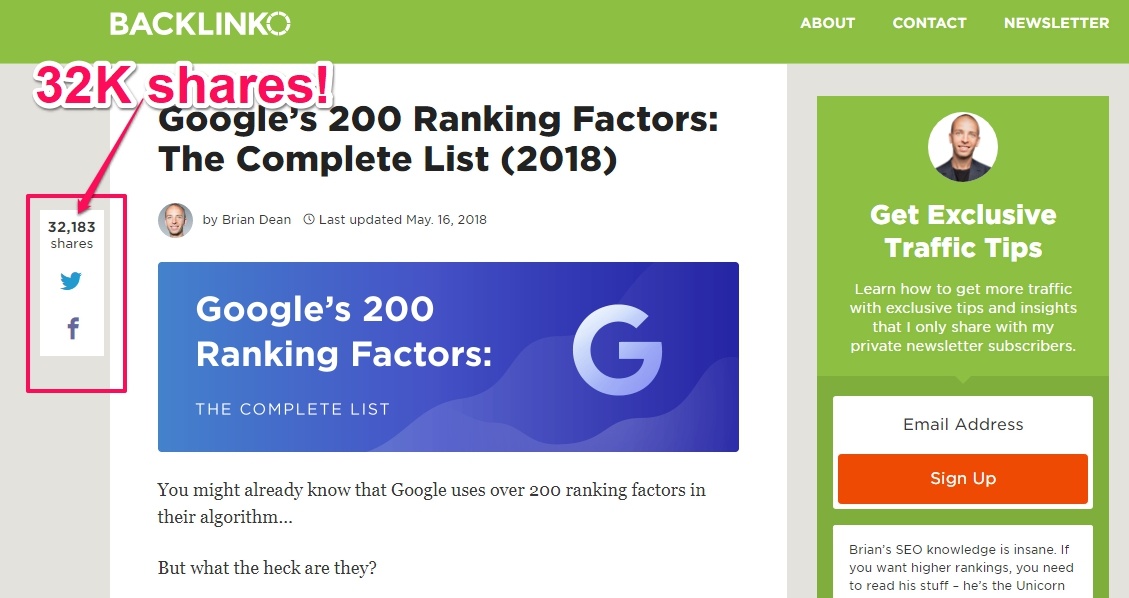
Source: Backlinko
His articles get thousands of completely natural backlinks and dominate search rankings for the most competitive keywords.

Source: Ahrefs
His blog isn’t as old and doesn’t have anywhere near as many articles as some of his competitors.
Yet, he’s left them way behind in a niche that’s considered over-saturated.
All because he was prepared to be better than his competitors.
On the other hand, if you’re not ready to work hard, don’t create enough value for your target audience, and don’t have a growth plan for your business, you won’t be able to stay on the top for long even in the easiest of niches.
Not sure what a growth plan is?
Let me explain in the next point.
07 – Not Having a Step by Step Plan for Growing Your Business
How far ahead do you think while choosing a niche for your site?
6 months? a year? 5 years?
If you’re like most newbies, you don’t think about the future at all.
Your niche selection is mostly based on impulsive decisions triggered by the success story of some other random blogger or a gut feeling that you’ll make money in this niche.
There’s usually no plan.
And as they say, failing to plan is planning to fail.
When it comes to the growth plan of a niche site, there are a number of things to consider.
- How long do you see yourself working in this niche? Is it something you’re really interested in and knowledgeable about?
- Is this a seasonal niche or something that’s evergreen?
- How successful are the other top sites in this niche, where are their traffic sources and how are they making money?
- Do you think you’re prepared to create a site that’s significantly more valuable and useful to your target audience?
- What are the broad questions and topics in this niche that you can further break down into individual blog posts and articles?
- Can you create a quarterly or bi-yearly content plan for your site?
- What is the best performing content type for this niche (video, audio, text) and do you have the capacity to create it?
- Is there enough interest and room in this niche to grow?
- What are your main traffic sources and how do you plan to grow them?
- Are there regular link building opportunities available in this niche?
- How hard is it to get links in this niche?
- Can you build a community around your site? Is it a niche where people like to discuss things with others?
- Do you have an end goal in mind? For example, are you building this site to sell on Flippa in a couple of years, or you’re creating it build a passive income engine that powers the other projects you plan to start in the future?
Are you still with me? Good!
It’s stupid to expect a complete newbie to have a flawless plan for growing a niche site.
But you need to think ahead while choosing a niche if you don’t want to waste your time and resources.
If you’ve already asked yourself the hard question and have a plan (even vague) you’ll be in a much better position to decide whether to choose a niche or not.
08 – Evaluating a Niche Solely Based on Google Search Traffic
Google Search is undoubtedly the biggest traffic source for most niche websites.
But is it the only source you should evaluate while choosing a niche?
Research seems to suggest something else.
According to a joint study by Statista and Parse.ly (a leading analytics platform that monitors millions of websites with billions of combined visitors), only 31.8% of articles are found through search engines. The rest of the traffic comes from social networks, email lists, referrals, and direct sources.
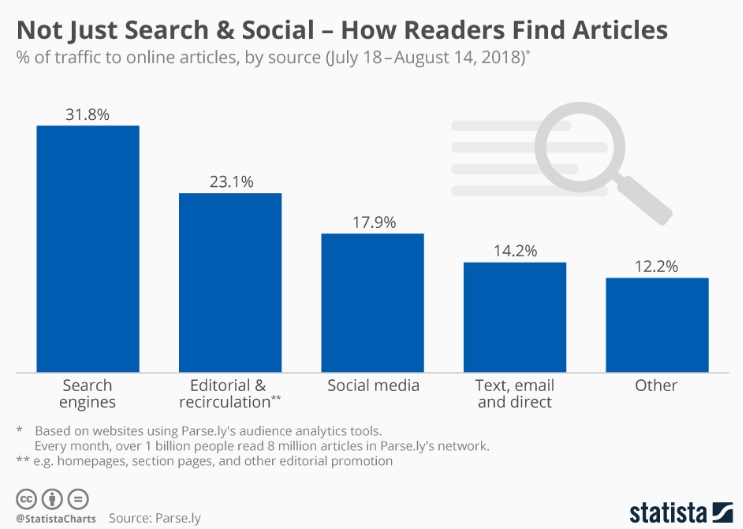
Source: Statista
A niche isn’t necessarily useless if the SERPS are too competitive or it doesn’t have a lot of traffic on its top search queries
There are just too many examples of successful niche sites that don’t rely on Google Search.
In fact, the sooner you quit this unhealthy obsession with Google Search traffic, the better.
A study by Affiliate Summit shows that successful affiliate marketers regularly use social networks, email lists, forums, and other traffic sources.

Source: Affiliate Summit
Search traffic is important but also evaluate a niche from a community-building perspective.
See if you can grow a Facebook Group, a forum, or a thriving email list in this niche. Look for examples where other marketers in that niche have built online communities.
Often, the conversion rate of the traffic originating from your email list or a dedicated Facebook Group is much higher than search traffic.
Which is why it’s foolish to write off a niche just because of its low search volume.
09 – Thinking That You Need To Be The Worlds Expert To Succeed
I’ve kept this point for the end but it’s really among the top mistakes that prevent people from taking advantage of profitable niches.
There’s no doubt that you need to be knowledgeable about a niche to succeed in it.
But you don’t need to be the worlds leading expert.
You can be a “relative expert” on a topic if you know more about it than your target audience.
According to a study by Hootsuite and We Are Social, nearly 47% of the world’s population still does not have access to the internet.
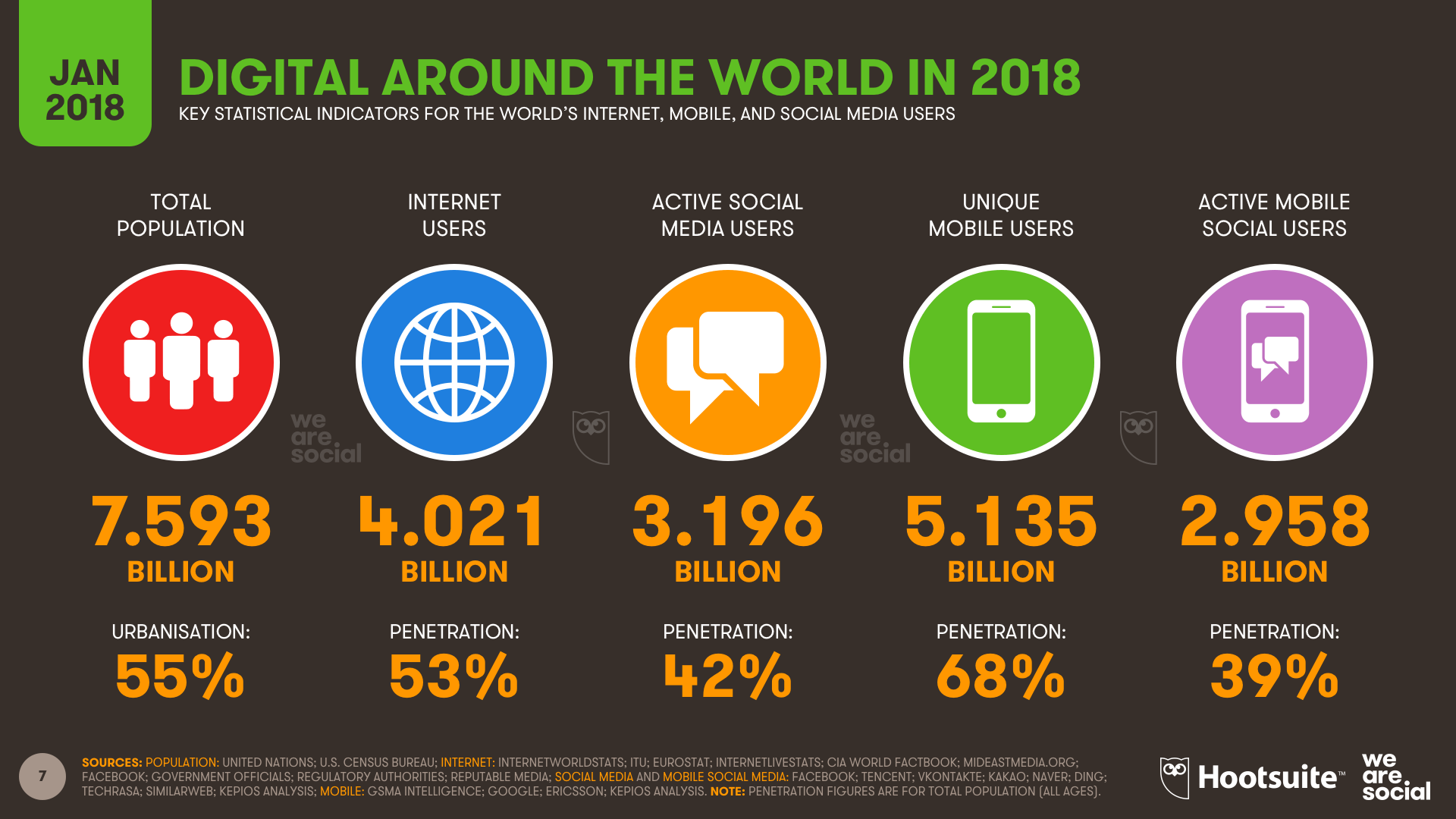
Source: We Are Social
Let’s assume that all the other internet users have more knowledge about a certain niche than you (which is impossible of course).
There are still millions of people who’re getting online every day for the first time in their lives who know nothing about that niche.
For them, you’re an expert.
For example, if today is the first day you’ve heard about SEO and you’ve spent a few hours learning about it, you’re still far more knowledgeable about it than someone who still doesn’t know what SEO is.
Sure you couldn’t teach anything to an SEO expert or an intermediate learner but to a brand, new, newbie then you have knowledge that’s useful to them.
It’s an extreme example, I know, but your status as a niche expert really depends on who you plan to target.
Tim Ferris, the author of “the Four Hour Work Week”, says that you become more knowledgeable on a topic than 95% of the average people if you read just 3 books about it.
Once you have more knowledge on a topic than an average person, you’re an expert for them.
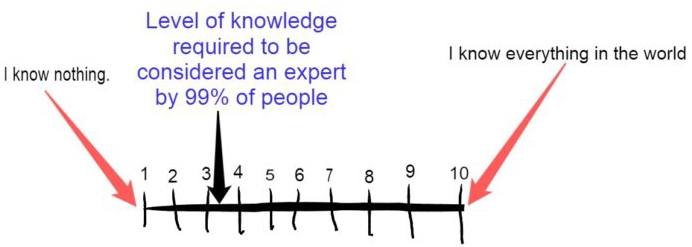
Source: SiaMohajer
As the image above shows, you don’t need to know everything about a niche to be knowledgeable enough to market in it.
You just need to know more than your audience.
So if you have some basic knowledge of a niche and you think you can improve it with a bit of research, don’t abandon it just because you’re not the ultimate expert on it.
You can still make money and build a hugely successful site by targeting the people who don’t know as much as you (and of course, by improving your knowledge with time).
It just boils down to targeting the correct target audience.
Are You Ready To Choose the Right Niche?
Here’s The Conclusion On It…
Choosing a niche for your site is the crucial first step that can have a defining impact on your success or failure.
But it isn’t as hard or as technical as most newbies think.
You just need to avoid the obvious pitfalls that I’ve highlighted in this post and focus on choosing a niche where you can create lots of value for your readers on a regular basis.
If you can do that, there’s no reason why you can’t succeed in any niche you choose.

![Reader Q&A: What Are The Most Profitable Niches For Affiliate Marketing? [Updated]](https://nichehacks.com/wp-content/uploads/2020/06/Reader-QA-What-Are-The-Most-Profitable-Niches-For-Affiliate-Marketing-Updated-850x541.jpeg)



